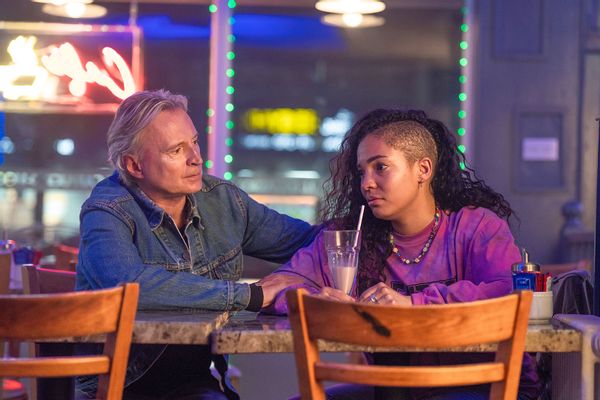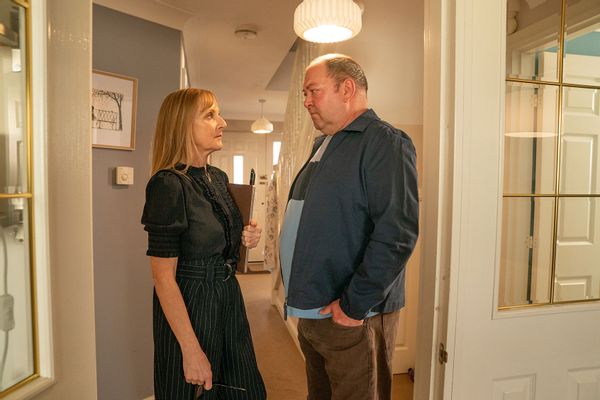"The Full Monty" left moviegoers with something its 2023 TV continuation doesn't, which is the gift of optimism. The 1997 film wasn't entirely giggles and adorable pelvic thrusts to Donna Summer's "Hot Stuff" while waiting in an unemployment line. Its writer Simon Beaufoy (FX's "Trust") jogged its six down-and-out Britons through an obstacle course of insecurity, body shaming, a shared sense of worthlessness and feared obsolescence.
But he also ended this glimpse at their run of bad luck with high-stepping mirth and one of the most joyous scenes in modern movies. The striptease promised in the movie's title, set to Tom Jones' "You Can Leave Your Hat On" ends with a freeze frame of the core cast's bare backsides, fading to black with a pervasive sense that somehow things would work out.
This arrives at the close of 91 minutes devoted to seducing us with Robert Carlyle's puckish Gaz, his best friend Dave (Mark Addy), their ballroom dancing acquaintance Gerald (Tom Wilkinson) and their recruits Lomper (Steve Huison), Horse (Paul Barber) and Guy (Hugo Speer) – average men to their core.
This is how a feel-good one-off bouncing with mountains of cheek sags into an eight-episode slog.
In exposing their thunder down under to supportive friends, neighbors and the local cops presumably waiting to arrest them on indecency charges, these laid-off steelworkers also embodied a chuck-it-all resilience missing among most stories about the working class.
"The Full Monty" spoke to a much broader audience than its $3.5 million budget may have indicated. Its worldwide box office gross came close to $260 million. The movie went on to earn four Oscar nominations and inspire a Broadway musical and live theatrical production. It also rocketed Carlyle, Addy and Wilkinson to the next level of international stardom.
Trusting that a story like this would remain untouched in its capsule is naïve, especially at a time when expanding existing properties is viewed as a safer bet than coming up with a wholly original idea. Maybe Beaufoy and (or?) his co-writer Alice Nutter had a new setting in mind to mount several intersecting stories about folks living on the margins or hanging off them by their fingernails.
But if there were ever a chance of audiences seeing them, they'd have to transmit them through characters we know, maybe, or recall, barely. This is how a feel-good one-off bouncing with mountains of cheek, literally and figuratively, sags into an eight-episode slog.
Welcome to yet another cell in the tyrannical supermax of IP.
In 2023, the meaning of "The Full Monty" has transformed from an act of liberating insouciance to a state of vulnerability and exposure. Returning us to Sheffield's denizens allows Beaufoy and Nutter to strive to say something meaningful about the dissolution of societal safety nets and our sense of community, along with various midlife crises. In some respects, they succeed. In others, however, the writers ply exhausted tropes conflating inclusive storytelling with white savior caping. And their gravest offense in this regard is how they treat one of their own.
 Robert Carlyle as Gaz and Talitha Wing as Destiny in "The Full Monty" (Ben Blackall/FX)
Robert Carlyle as Gaz and Talitha Wing as Destiny in "The Full Monty" (Ben Blackall/FX)
Contributing to the overall disarray of "The Full Monty" is Speer's mid-production firing resulting from accusations of inappropriate conduct. That means he's there for a little while and then suddenly isn't, bumping his fiancée Paula (Kate Coogan) into scenarios where he was obviously meant to go. But the casually offered anecdotes explaining his absence quickly emit a "Weekend at Bernie's" stench. If only everything around them were as funny.
Twenty-five years after we left the stripping troupe, each man has settled into a variant of a groove or slump. Gaz has two children now. Nathan (Wim Snape) introduced as a kid in the movie, has grown up to be a policeman living in constant fear that his father or kid sister Destiny (Talitha Wing) will turn in up in a holding cell. His concerns aren't off-base; Gaz may work as a hospital porter but he still engages in extralegal activity, a hobby Destiny has inherited although, like Nate, she despises her father.
One can't say that "The Full Monty" entirely forgets that it started as a comedy. The renewed focus on Gaz guarantees that episodes are never entirely without a few scenes that tease out a smile. Lomper, who Dave and Gaz met in the film by interrupting his suicide, is long out of those woods. Now he's caught in a briar patch of predatory lending endangering his life and his and Dennis' livelihood.
 Paul Clayton as Dennis and Steve Huison as Lomper in "The Full Monty" (Ben Blackall/FX)
Paul Clayton as Dennis and Steve Huison as Lomper in "The Full Monty" (Ben Blackall/FX)
Dave works as a caretaker at Sheffield Spires Academy where his wife Jean (Lesley Sharp) serves as the headmistress. She's also ambitious and a workaholic, two traits preventing her from fully absorbing the suffering around her, including Dave's. Sheffield is also falling apart – its plumbing is failing, its ceilings are crumbling and its budget is stretched to breaking. Who could fix this? Why, none other than Guy, who is now a wealthy beneficiary of government inefficiency.
Lomper owns a café called The Big Baps with his husband Dennis (Paul Clayton), where Gerald spends his days being a grumpy old man. And Horse, the oldest of the crew, is a disabled hoarder who can barely take care of himself. When the government requires him to show up at one of their assistance offices to be interviewed, the cracks he was already falling into yawn open and swallow him whole.
Beaufoy and Nutter, who co-write every episode, can't resist shoehorning what feels like every major social ill into this season.
The problems facing Dave and Jean are variations on a theme begun in the movie – he was made to feel insecure about his looks and his ability to provide. In the intervening years, the couple has sustained another tragedy that colors where they are now.
Her coldness toward Dave sharpens when he takes a bullied, poverty-stricken student nicknamed Twiglet (Aiden Cook) under his wing. As the school's administrator, she knows any personal relationship between an adult authority figure and a child is viewed with suspicion. But Twiglet is starved for food and care. Dave can relate.
 Lesley Sharp as Jean and Mark Addy as Dave in "The Full Monty" (Ben Blackall/FX)
Lesley Sharp as Jean and Mark Addy as Dave in "The Full Monty" (Ben Blackall/FX)
Beaufoy and Nutter, who co-write every episode, can't resist shoehorning what feels like every major social ill into this season by having their non-white characters shoulder the burden. A newcomer to the group, Darren (Miles Jupp), gets to be our pasty Virgil witnessing and commenting on the cruelty of homelessness before it lands on his doorstep in the form of a Middle Eastern woman, Silvan (Halima Ilter), ratted out by Darren's NIMBY neighbors. She's also very attractive and introduces him to spiced foods; he's a lonely, generic British potato. You can see where this is going, and it's tiresome.
Want a daily wrap-up of all the news and commentary Salon has to offer? Subscribe to our morning newsletter, Crash Course.
But nearly every character who isn't one of the main white guys is sentenced to the role of martyr, perhaps none as much as Horse.
"The Full Monty" doesn't evenly distribute its character development in the movie, anchoring its focus on Gaz and Dave's relationship. They're where the adventure begins, after all. But eight installments ranging in length between 38 and 51 minutes is more than enough time to expand what we know about most of these men if not all of them. Horse plays a pivotal role across the season, but primarily as a device to walk us through an all-too-common but unthinkable scenario.
We never get to know him as an individual but are instead expected to be content with his part in this puzzle. But then we eventually see that his friends of 25 years never got to know him either, which makes everything that befalls him land with bitterness as opposed to melancholy. Carlyle, who voices this epiphany as Gaz, colors this realization with sorrow, but everything leading up to it fails to explain these friends' carelessness. A viewer can't help but attribute their ignorance less to self-involvement than clumsy scripting.
There's a moving new story scrambling to get out from under the mess of established history this series services, led by Destiny and her teenage friends, and the anger coursing through them at a system that doesn't care if they flourish in school or drop out to assume their place in some company's factor or at a service job.
An enticing subplot centers on the school's music teacher and Jean's best friend Hetty (Sophie Stanton), one of the few teachers who is invested in tending to her students' talents and potential, especially Destiny's.
When municipal carelessness deals her a blow, obliterating her music room, she assembles her lost lambs into a revenge choir singing out their frustration in rousing choral arrangements of pop tunes like CeeLo Green's "F**k You."
That energy is akin to the electricity that made the movie so winning, with underdogs flipping off the circumstances conspiring to keep them low. The vital difference is that 25 years ago, Beaufoy understood that such stories are enlivened when desperation cedes the spotlight to inspiration. Now he's spreading that dollop of sweetness over too much common misery.
FX's "The Full Monty" series is now streaming on Hulu.



Shares